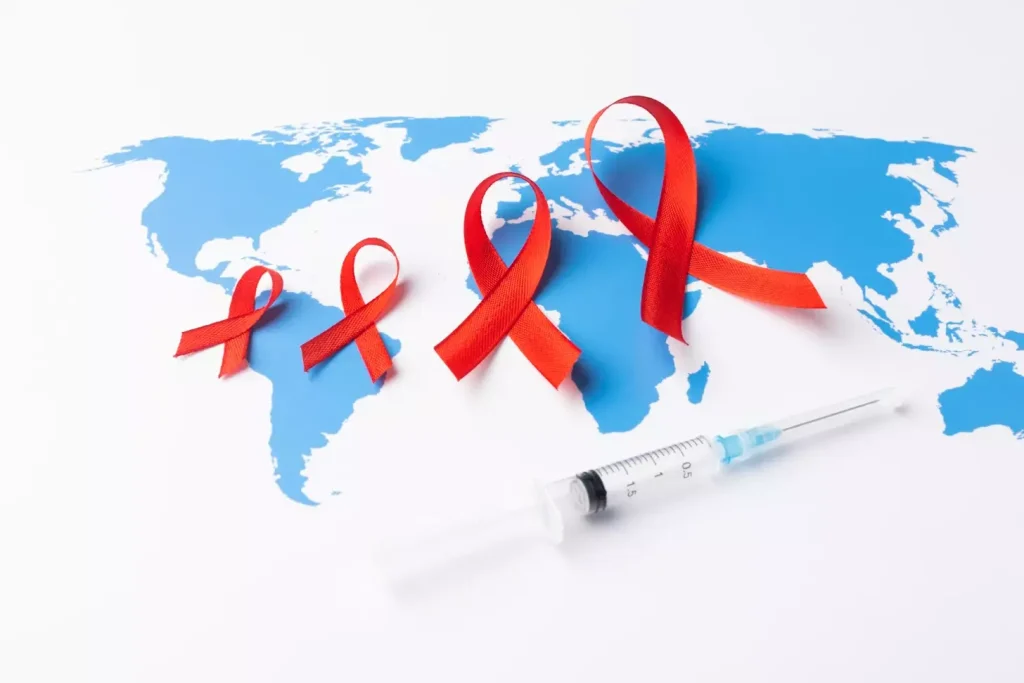
Cervical cancer is a common cancer among women worldwide. It needs a complete treatment plan. We look at natural ways to treat it, mixing traditional medicine with holistic treatment practices.
Methods like nutritional therapy, herbal supplements, acupuncture, and mind-body therapies help. At Liv Hospital, we aim to give top-notch healthcare. We support patients with these natural remedies to boost their health.
These methods can help patients get better and deal with side effects. Our team creates a care plan just for each patient. We work together to make it personal.

Cervical cancer is a big threat to women’s health worldwide. It affects different parts of the world in different ways. Knowing how cervical cancer impacts us globally is key to finding better treatments and helping patients.
Cervical cancer is a common cancer among women worldwide. Many new cases are diagnosed every year. It’s more common in developing countries where screening and prevention are hard to get.
It’s linked to human papillomavirus (HPV), a main cause of the disease. Places with more HPV cases also have more cervical cancer. This shows why HPV vaccines and screenings are so important.
Doctors use watchful waiting, removing the cervical lining, and HPV vaccines to treat cervical cancer. For early stages, watchful waiting is often used. This means regular checks to see if the abnormal cells turn into cancer.
For more serious cases, surgery might be needed. This could be removing the cervical lining or, in extreme cases, a hysterectomy.
These treatments work well but can be tough on patients. This is why we need more support to help patients feel better and live better lives.
Some treatments can be very invasive. This is why we need more support to help with symptoms and side effects. Support can include nutrition, herbal medicine, and mind-body therapies.
Adding these to treatment plans can make patients feel better and stronger. This approach helps with the physical, emotional, and mental needs of patients.

Many patients with cervical cancer look into alternative medicine. This includes a wide range of practices not part of regular medical care. They can be used alongside traditional treatments.
Complementary and Alternative Medicine (CAM) covers many areas. This includes mind-body therapies, biologically based practices, and more. Mind-body therapies like meditation and yoga help with stress. Biologically based practices use natural substances like herbs.
It’s key to know that some CAM therapies are studied for benefits. But others may not have enough evidence or could affect regular treatments. So, always talk to your doctor before trying any CAM therapy.
An integrative approach mixes regular medical care with CAM therapies. It treats the whole person – body, mind, and spirit. Integrative cancer care aims to improve outcomes by combining the best of both worlds.
For example, acupuncture can help with side effects. Nutritional therapy supports overall health. The goal is to use alternative therapies safely and without harming regular treatments.
Safety is critical when exploring alternative medicine for cervical cancer. Always talk to your healthcare provider before starting any CAM therapy. They can help ensure it’s safe and works well with your treatment.
Doctors can guide how to add CAM therapies to your care plan. They can also watch for any bad effects. This way, you get the best care possible.
We know how important nutritional therapy is for cervical cancer patients. It’s not a replacement for standard treatments. Instead, it helps improve overall health during treatment.
An anti-cancer diet is full of nutrients that boost the immune system. It includes fruits, vegetables, whole grains, and lean proteins. Avoid processed foods, sugars, and unhealthy fats.
Key Components of an Anti-Cancer Diet:
Antioxidant-rich foods protect cells from damage. Eating foods high in antioxidants can reduce oxidative stress and inflammation. This helps the body fight cancer better.
Examples of Antioxidant-Rich Foods:
Some nutritional supplements can help support the immune system of cervical cancer patients. Supplements like vitamin D and selenium might be beneficial. Always talk to your healthcare provider before adding any supplements.
| Supplement | Potential Benefits | Precautions |
|---|---|---|
| Vitamin D | Supports immune function | Consult on optimal dosage |
| Selenium | Antioxidant properties | Avoid excessive intake |
| Green Tea Extract | Antioxidant and anti-inflammatory effects | May interact with certain medications |
It’s vital for patients to talk to their healthcare team about their nutrition plans. This ensures any supplements or dietary changes are safe and effective.
Curcumin and turmeric are key in herbal medicine against cancer. Curcumin, found in turmeric, has shown promise in fighting cancer. We’ll look into its effects on cancer cells, how to take it, and its use with traditional treatments.
Research shows curcumin can kill cancer cells and stop tumors from growing. Its ability to reduce inflammation and act as an antioxidant makes it a strong candidate for cancer treatment. More studies are needed to fully grasp its role in cancer care.
Key Findings on Curcumin:
You can get curcumin from turmeric in food or supplements. The right amount varies. Always talk to a healthcare provider to find the best way to take it for you.
| Form | Dosage | Considerations |
|---|---|---|
| Dietary Turmeric | Regular culinary amounts | Part of a balanced diet |
| Curcumin Supplements | 500-2000 mg/day | Consult a healthcare provider |
Using curcumin with traditional cancer treatments might boost its benefits. But, it’s important to talk to a healthcare provider first. They can help ensure it’s safe and won’t interfere with other treatments.
We believe in a complete approach to cancer care. This includes traditional treatments and natural options like curcumin. Knowing about curcumin’s benefits and how to use it can help patients make better choices for their health.
Research on Nigella sativa and its key compound thymoquinone shows great promise against cancer, including cervical cancer. Nigella sativa, also known as black seed, has been a staple in traditional medicine for centuries. It’s known for its many health benefits.
Studies have found that black seed oil from Nigella sativa contains thymoquinone. This compound has shown to fight cancer. It can make cancer cells die, including those from cervical cancer.
Thymoquinone works by changing how cells grow and die. It stops cells from growing too much, makes them die, and lowers inflammation. These actions help fight cancer.
Thymoquinone can affect cancer cells in several ways:
These actions make thymoquinone a good addition to traditional cancer treatments.
While Nigella sativa and thymoquinone show promise, it’s key to use them correctly. Black seed oil can be taken as a supplement. But, it’s important to talk to a doctor about the right amount and how it might affect other treatments.
We suggest talking to a healthcare provider before using Nigella sativa or thymoquinone supplements. This ensures they are used safely and effectively with your current treatment plan.
Flavonoids are compounds found in plants and are being studied for their anti-cancer effects. Quercetin is a key focus. We look at how quercetin and other flavonoids can help in treating cervical cancer.
Quercetin is found in many fruits, vegetables, and grains. Apples, onions, berries, and leafy greens are among the richest sources. Eating these foods can naturally increase your quercetin intake.
Quercetin can affect cancer cells in several ways. It can make cancer cells die and stop tumors from growing. This makes quercetin a promising area for further research and treatment.
Key mechanisms include:
These actions show quercetin’s value as a complementary therapy for cervical cancer.
Quercetin can be found in food or taken as a supplement. The right amount varies, and talking to a healthcare provider is key. Supplements should be used with caution to avoid interactions with other treatments.
Always talk to a healthcare provider before starting supplements to ensure they are safe and effective.
Looking into Bauhinia variegate candida and other botanical extracts for cervical cancer treatment is exciting. These natural compounds might help traditional treatments work better.
Bauhinia variegate candida has been used in traditional medicine for many things. Now, research is looking into its anti-cancer effects. It might help kill cancer cells by making them die naturally.
A study found that Bauhinia variegate candida extracts can stop cancer cells from growing. Other botanical extracts also show promise in fighting cancer.
Apoptosis, or programmed cell death, is key in many cancer treatments. Botanical extracts like Bauhinia variegate candida might trigger this process. This could help stop tumors from growing.
If you’re thinking about using Bauhinia variegate candida or other botanical extracts, finding good products is important. Always talk to a healthcare provider. They can help you choose the right products and make sure they won’t harm your treatment.
| Botanical Extract | Traditional Use | Modern Research Focus |
|---|---|---|
| Bauhinia variegate candida | Various medicinal purposes | Anti-cancer properties, apoptosis induction |
| Curcumin | Anti-inflammatory | Anti-cancer effects, bioavailability enhancement |
| Thymoquinone | Antioxidant | Cancer cell inhibition, immune system support |
Understanding the benefits and how to use these extracts can help patients make better choices. It’s key to use these natural therapies with traditional treatments. Always do this under the advice of healthcare professionals.
Acupuncture and traditional Chinese medicine (TCM) can help cervical cancer patients. They can improve their quality of life. These therapies are great additions to traditional treatments.
Acupuncture is a big part of TCM. It involves tapping certain body points to boost health and ease symptoms. Studies show it can help with pain, nausea, and tiredness.
Benefits of Acupuncture:
Chinese herbal formulas are key in TCM for cancer patients. Some herbs might fight cancer or lessen side effects. Always talk to a skilled practitioner about the right herbs for you.
Key Considerations:
Finding a good TCM practitioner is very important. Look for someone who is licensed and has experience with cancer patients. Always check credentials and ask for recommendations from doctors.
Tips for Finding a Qualified Practitioner:
Mind-body therapies are key in treating cervical cancer holistically. They connect the mind, body, and spirit. This helps improve well-being and supports healing.
Meditation and mindfulness help reduce stress and anxiety in cancer patients. They focus on the present, helping manage symptoms and improve life quality. Start with short sessions and increase as comfort grows.
Benefits of Meditation and Mindfulness:
Yoga combines postures, breathing, and meditation for well-being. It helps cervical cancer patients by easing side effects, improving flexibility, and reducing fatigue. Choose a qualified instructor experienced with cancer patients.
Chronic stress harms the body’s fight against cancer. It activates stress response, leading to inflammation and possibly cancer growth. Reducing stress is vital in cancer care.
The following table summarizes the key mind-body therapies and their benefits for cervical cancer patients:
| Therapy | Benefits |
|---|---|
| Meditation | Reduces stress, improves mood, enhances sleep |
| Mindfulness | Manages symptoms, improves quality of life |
| Yoga | Alleviates treatment side effects, improves flexibility, reduces fatigue |
By adding mind-body therapies to their care, cervical cancer patients can actively participate in their treatment. This can lead to better outcomes and a higher quality of life.
Helping cervical cancer patients through lifestyle changes can greatly improve their health and treatment results. We believe that caring for cancer goes beyond just treatments. It also means making lifestyle changes that help with physical, emotional, and social health.
Good sleep is key for cervical cancer patients. It helps with recovery, keeps the immune system strong, and boosts emotional health. To sleep better, patients should stick to a regular sleep schedule and have a calming bedtime routine. They should also avoid activities that get them excited before bed.
Creating a peaceful sleep space, like a cool, dark, and quiet room, can also help. We suggest trying relaxation methods like deep breathing or muscle relaxation to reduce stress and improve sleep. By focusing on better sleep, patients can live better and possibly get better treatment results.
Doing the right kind of exercise is important for cervical cancer patients. Exercise can help manage side effects, improve physical function, and boost overall health. We recommend talking to a healthcare provider to create a workout plan that fits their needs and abilities.
Yoga, walking, or swimming are good choices because they help with physical function without risking injury. Adding exercise to their daily routine can make patients feel better physically and emotionally.
Having a supportive community is essential for cervical cancer patients. It offers emotional support, reduces feelings of loneliness, and creates a sense of belonging. We encourage patients to join support groups, either in-person or online, to connect with others facing similar challenges.
Keeping strong ties with family and friends is also important. They can offer emotional support and practical help. Building a supportive community helps patients feel more empowered and able to handle their condition.
Access to mental health support is a key part of holistic care for cervical cancer patients. We know that a cancer diagnosis can deeply affect a person’s emotions and mind. It’s important to address these aspects of care.
Patients can benefit from counseling, therapy, or other mental health services. These can help with anxiety, depression, or other emotional challenges linked to their diagnosis and treatment. By making these resources available, we help patients deal with the emotional and psychological sides of their care.
Combining natural methods with medical care is key for treating cervical cancer fully. We’ve looked at different alternative medicine options. These include nutrition, herbal supplements, acupuncture, and mind-body therapies.
Using these holistic treatments with traditional care can lead to better results and health. For example, nutrition helps the body fight off illness. Herbal supplements like curcumin and thymoquinone might also fight cancer.
Acupuncture and mind-body therapies help with symptoms and stress. This improves overall health. It’s important to talk to doctors to make sure these natural methods work well with medical treatments.
We stress the need for teamwork in care. Patients and their healthcare team should work together. They should create a treatment plan that uses the best of both worlds.
Nutritional therapy is key in treating cervical cancer. It boosts the immune system. It also helps by using an anti-cancer diet full of antioxidants and nutrients.
Curcumin, from turmeric, might help fight cancer. But, talk to your doctor first. They can help figure out the right amount and how it works with other treatments.
Nigella sativa, or black seed, has thymoquinone. It might kill cancer cells and change how cancer grows. Always check with your doctor about the right amount and how it works with other treatments.
Quercetin, found in fruits and veggies, might slow cancer growth. It could also kill cancer cells. Talk to your doctor about how much to take and any possible side effects.
Bauhinia variegate candida and other plants might fight cancer. But, always talk to your doctor. They can help with the right amount and how it works with other treatments.
Acupuncture can help with cancer symptoms like pain and nausea. But, always check with your doctor first. They can make sure it’s safe with your other treatments.
Mind-body therapies like meditation and yoga can help. They reduce stress and improve mood. Stress can make cancer worse, so these techniques are important.
Good sleep, exercise, and a supportive community can improve life. Mental health support is also key for emotional and psychological care.
Always talk to your doctor before trying alternative medicine. They can make sure it’s safe with your other treatments.
Talking to your doctor is important for herbal supplements. They can help with the right amount and any possible side effects.
An anti-cancer diet is helpful. Eat foods high in antioxidants like fruits, veggies, and whole grains. They boost the immune system.
Alternative medicine should not replace regular treatments. Always talk to your doctor. They can help find the best mix of treatments for you.
• Zhou, Z. W. (2022). Therapeutic effects of natural products on cervical cancer. Retrieved from https://pmc.ncbi.nlm.nih.gov/articles/PMC9136176/
• Zaman, M. S., et al. (2016). Curcumin nanoformulation for cervical cancer treatment. Scientific Reports, 6, 20051. https://www.nature.com/articles/srep20051
• Natural treatments for cervical dysplasia | Research Starters – EBSCO. Retrieved from https://www.ebsco.com/research-starters/complementary-and-alternative-medicine/natural-treatments-cervical-dysplasia
• Complementary and alternative medicine (CAM). National Cancer Institute. Retrieved from https://www.cancer.gov/about-cancer/treatment/cam
• Treatment of cervical cancer. Centers for Disease Control and Prevention. Retrieved from https://www.cdc.gov/cervical-cancer/treatment/index.html
Subscribe to our e-newsletter to stay informed about the latest innovations in the world of health and exclusive offers!